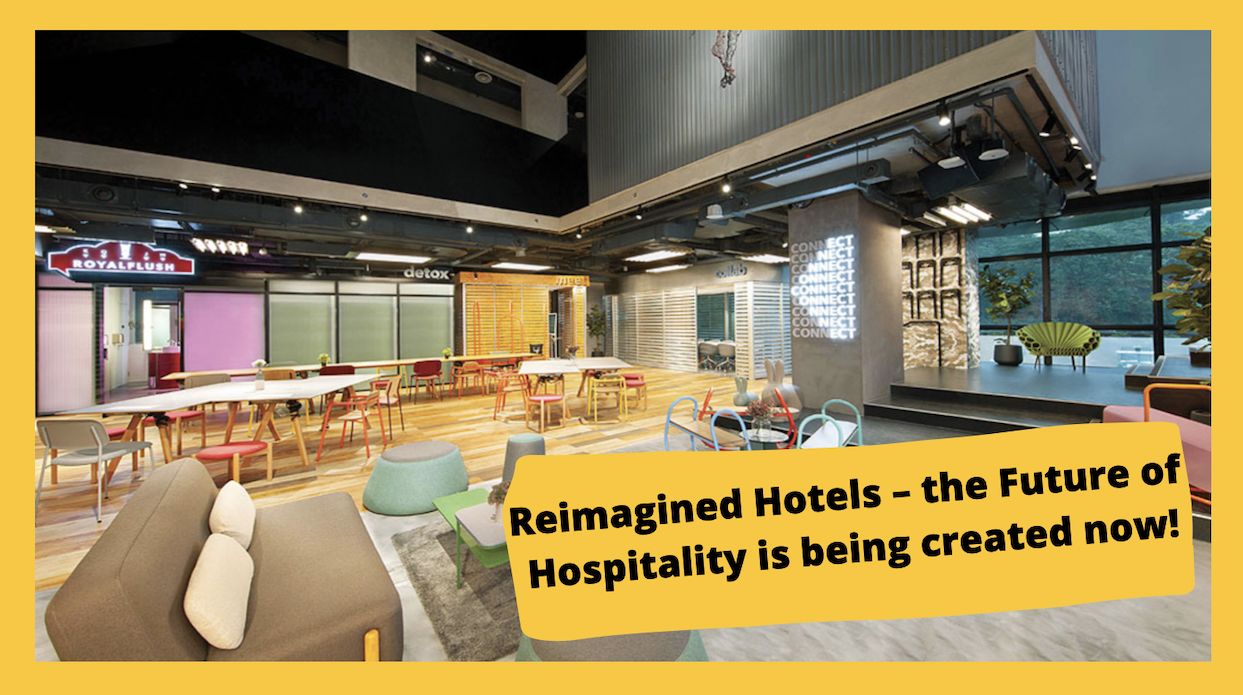Welcome back to the hospitality blog, today we will talk about the new direction that modern city hotels are actively taking. City hotels are adopting a concept similar to the principle of sharing economy, which is particularly popular among Millennials and Gen Z’s.
 Source: The People Who Share
Source: The People Who Share
Everybody knows Airbnb. At its core, Airbnb strives to be the essence of the sharing economy and it has become a major player in hospitality over the past few years. Worth almost $20 billion, Airbnb has a market cap higher than hotel businesses such as Starwood, Accor, and InterContinental. Those statistics have many hotel professionals worried and for a good reason.
In the nearest future, more and more hotels will start offering shared rooms for travellers who aim to have a different experience, whether it be price or culturally driven. This new trend is already pushing the traditional travel industry business to offer workspaces, hotel rooms and rental cars at hourly rates.
The sharing economy idea will continue to create new markets and processes for the entire industry.
According to the recent report by Deloitte, next-generation guests require flexibility that lets them shape their own experiences when and how they want to. Millenials and Generation Z have a changed value system, in which a strong sense of community, careful use of resources through the “sharing economy” and desire for human connections play an overriding role.
 Source: Deloitte report – “The hotel guest experience landscape”
Source: Deloitte report – “The hotel guest experience landscape”
Delivering “the new basics” is already expected from a hotel and young travellers give their preference to properties that offer something more than that – friendly atmosphere, coworking space, functional environment and real “experiences” that can be shared with others.
 Source: Deloitte report – “The hotel guest experience landscape”
Source: Deloitte report – “The hotel guest experience landscape”
In order to meet the requirements of modern society, hotels are reducing the room sizes and investing more in multifunctional common spaces and increasing their efficiency. Interestingly, some experts hold quite an ‘extreme’ opinion and suggest that hotel rooms “will become a thing of the past”. Well, there is no doubt that the new concept will have a disruptive effect on the traditional temporary accommodation services industry. But is it a bad thing? Let us have a look at some examples…
The motto of hotels who have adopted the sharing economy concept sounds like this :
“Enjoy your stay, create your network, work in a stimulating environment. That is hospitality”. – 21 Way Of Living
1. 21 Way of living
21WOL Milano Centro is a Hotel, Coliving and Coworking space in Milan. It offers guests the privacy of their own space, the comfort of a hotel and modern environments to meet like-minded people. Apart from providing comfortable accommodation, 21WOL has scheduled community events in the common areas that create opportunities to meet and share.

![]() 2. Citizen M
2. Citizen M
Citizen M is a hybrid hotel that isn’t just a place to sleep, but somewhere to work, relax, and play. It started with an idea to disrupt the traditional hotel industry by creating a hotel for today’s modern travellers, who value a luxury hotel experience in central city locations at an affordable price.
CitizenM operates over 20 hotels across North America, Europe, and Asia, with 18 new hotels under development globally. By the way, you can find one in Zürich 🙂

3. Joe & Joe
Joe & Joe can be best described as “an ‘Open House’ living space that’s surprising and innovative.” It is a game-changing hospitality brand which blends the originality of private rental spaces (think: Airbnb) with the social experience of hostels, and the comfort and security of hotels. The concept offers a variety of affordable accommodation types, which include some unexpected options such as yurts, buses and treehouses, social spaces, laundry rooms, and collaborative kitchens where guests can show off their culinary skills.
Jo&Joe manages 2 hotels in France – in Paris and Hossegor.

https://www.youtube.com/watch?v=Z1d6oPwUSxg&t=56s
4. LYF
This one is located a little bit far away from Europe (in multiple Asian countries), but is worth being included in the list because it has all the characteristics of a modern city hotel. There were coworking areas, co-living spaces, thematic rooms, recreational zones and a feedback wall to collect students’ inputs.
Colourful, fun and with Instagram-able moments at every turn, LYF offers a dynamic live-work- play experience with a plethora of collaborative spaces. Isn’t LYF wonderful?
 The increasing appearance of similar hotels indicates that this trend is here to stay. What do you think about such a transition of ordinary city hotels into multifunctional «co-living» properties? Would you like to stay in one? Let me know in the comments below.
The increasing appearance of similar hotels indicates that this trend is here to stay. What do you think about such a transition of ordinary city hotels into multifunctional «co-living» properties? Would you like to stay in one? Let me know in the comments below.
- To find out more about the advantages of «co-living» and «coworking» visit this post – Co-Living With a Bunch of Digital Nomads
- Do you want to know how to find your perfect hotel for an attractive price? This post is for you – Optimize the price of your dream hotel | Travel 2.0
Thank you for your visit and I will see you in the next post, which will be in the video format. Missed the previous video? Here is the link.




Thank you for the good write up and now I want to visit all of the hotels mentioned! 🙂
Thank you for your comment Demet! Same here, I think all of them differ from in other in some ways 🙂 We will have them in mind while planning future city trips 🙂
Well, I would definitely like to stay in more than one?! But if I would have to choose right now, I think I would go with “Joe & Joe”, looks just too cool not to check it out.
It will be very interesting to see how the sharing economy will change our way of living.
As always, great blog post, Sophia! Very informative and nicely put together ?
Thank you commenting! Joe Joe is definitely on the list for the Paris trip!
Oh, and also, thank you very much for referring to one of my posts! I appreciate it ?
Very nice visuals and very informative! Thank you for sharing, Sofia! 🙂
I appreciate your comment Nicole! Thank you so much!